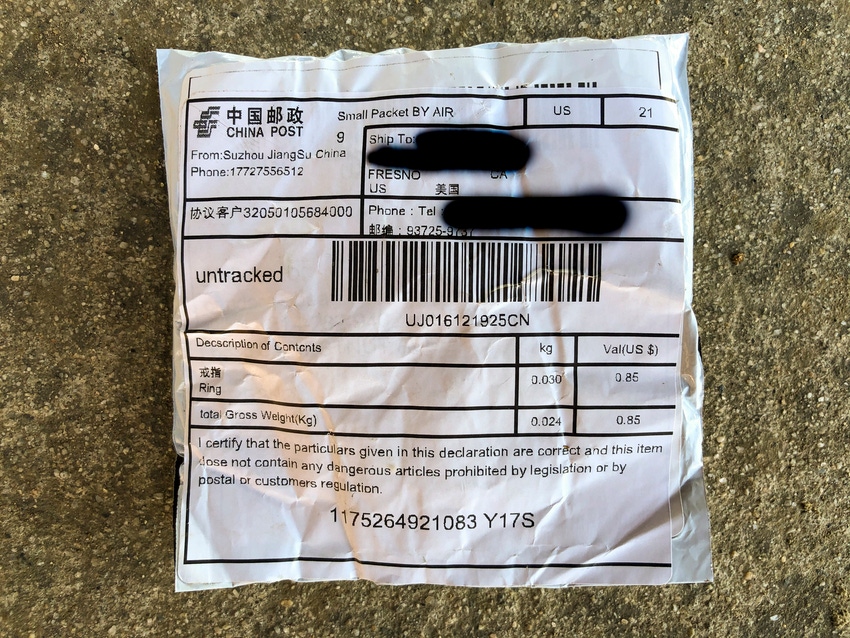
Internet reports of the unsolicited distribution of unidentified seeds in small packages has apparently captured the attention of federal agricultural officials, but not before reports of people planting them in at least one state.
"These aren't magic beans," one California agricultural commissioner told me on the phone.
Still, some people have apparently planted the unidentified seeds, according to Fresno County Calif. Agricultural Commissioner Melissa Cregan. She said reports from within the association of county ag commissioner she belongs to suggest some people may have planted them out of curiosity.
Do not do this!
State officials across the country and the U.S. Department of Agriculture are now warning people who may have received these small packages in the mail to immediately turn them over to agricultural officials.
Deliveries of the small packages with what appears to be Chinese characters and other foreign addresses may have been made for several months, but over time the issue looks to have gained some traction as repeated social media posts show images of small packages, similarly configured in both text and form, with seeds some say can appear similar to pumpkin seeds, garlic or other small seeds.
In California recently, Ryan Jacobsen with the Fresno County Farm Bureau said friends of his, contacted him to ask about the unsolicited seed packets received in the mail. Knowing what he does about farming and quarantine issues, Jacobsen said he urged his friends to immediately give him possession of the materials so he could ensure they were safely delivered to local agricultural inspectors. He delivered at least one of these packages to Cregan's office.
Jacobsen says at least one other package was turned in to the Merced County Department of Agriculture.
Cregan is still trying to gain direction from the California Department of Food and Agriculture over the proper protocols for these materials. So far, she has been told to take possession of the seeds and await further direction from state or federal officials.
In cases like California, concerns over plant materials and quarantine matters cannot be overplayed. Ditto the remaining 49 states. According to Cregan, known plant viruses can be spread through their seeds. Once these viruses are released to the environment it is effectively impossible to stop them
"It's scary that something like this can be introduced in such a way," she said.
Cregan says this illustrates just how easy it is to send items to people without regard to human or agricultural safety. Cregan's office employs dog handler teams that regularly scout parcel shipments for plant materials that could be the subject of state or federal quarantines. The goal: protect California's multi-billion-dollar agriculture industry from plant disease.
While she has written agreements with the private shipping companies to open and inspect packages her dog teams alert on, federal law prohibits her doing so with anything sent through the U.S. mail. Even if the dogs alert on a mail package, that package can only be surrendered to the shipper or receiver.
News releases tell us that the Department of Homeland Security and Customs and Border Protection are involved with this. Given trade and other strained issues between the United States and China, should these packages raise serious concerns? What does this say to our larger issues surrounding national security and food safety?
To date little information has been released by the USDA. A four-paragraph statement from the USDA says it "is aware that people across the country have received suspicious, unsolicited packages of seeds that appear to be coming from China." Outside of that statement, which urges people to not plant them and to turn them over to state officials, the USDA says it cannot elaborate on the issue. They cannot even tell the media how many states may be involved in this in an age where Americans are daily inundated with numbers related to positive cases of human illness.
All the USDA is willing to say currently is "we don't have any evidence indicating this is something other than a 'brushing scam' where people receive unsolicited items from a seller who then post false customer reviews to boost sales."
Really? Why then do the packages contain unidentified seeds – some even with grammatically incorrect instructions of how to plant them – instead of rings or other jewelry, as clearly stated on the packing slips?
What are these seeds? Where do they come from and how are people selected for these unsolicited mailings? What biological materials might they contain? Could this issue be of more concern than COVID-19 given all the nefarious possibilities?
Currently there are more questions than answers. Let's hope our local, state and federal agricultural inspectors and agencies have the necessary tools and unfettered access to appropriate testing labs to determine what threats this may pose to our nation's food supply and national security. We do not have the luxury of shrugging this off to an inconsequential marketing ploy.
About the Author(s)
You May Also Like






